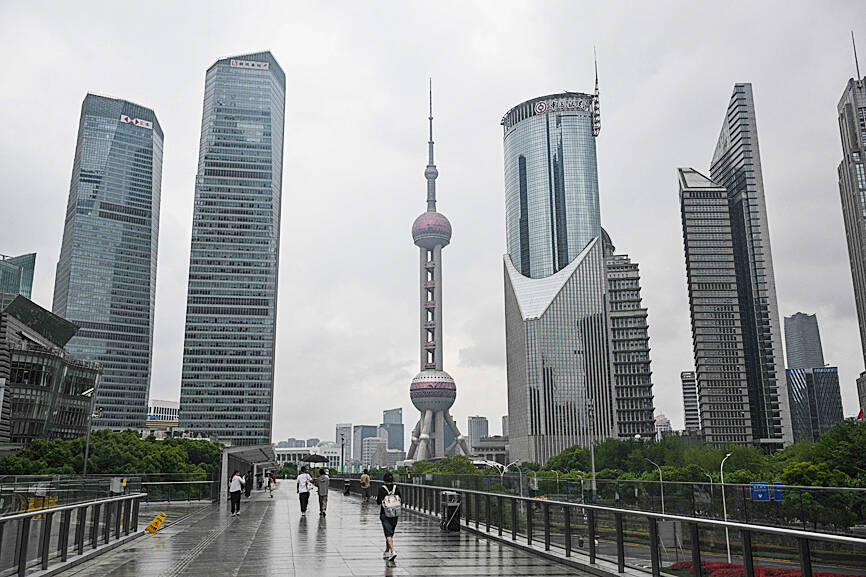Exposure to China among financial service companies in Taiwan fell 8.9 percent from a year earlier to NT$1.02 trillion (US$31.41 billion) at the end of last quarter amid concerns over a slowing Chinese economy and rising geopolitical risks, data compiled by the Financial Supervisory Commission (FSC) showed yesterday.
Their exposure was down NT$100.018 billion as Taiwanese banks cut their combined exposure — including lending, investments and interbank loans and deposits — to NT$936.161 billion, down NT$73.997 billion, or 7.33 percent, from a year earlier, commission data showed.
Local banks’ exposure to China reached the lowest level since the commission started tallying it in the third quarter of 2013.

Photo: AFP
Taiwanese banks in the second quarter scaled back lending to the Chinese market by a combined NT$77.259 billion from a year earlier and decreased investments by NT$7.659 billion over the same period, although interbank loans to Chinese counterparts rose by NT$10.922 billion, the FSC said.
Their exposure accounted for 20.3 percent of the sector’s net worth at the end of second quarter, sliding for a 24th straight quarter and also hitting the lowest level since the data became available, the data showed.
Taiwanese insurance companies’ investments in marketable securities in China fell 25.8 percent from a year earlier to NT$70.3 billion at the end of last quarter, accounting for only 0.21 percent of the sector’s total disposable funds, the commission said.
The investments in Chinese securities were all made by life insurers, while property and casualty insurers have held no securities in China since January last year, it said.
Taiwanese securities and futures brokerages, as well as securities investment trust and consulting firms, cut their combined exposure to China by 9.67 percent annually to NT$14.207 billion at the end of last quarter, accounting for a mere 1.88 percent of the sector’s net worth, it said.

COMPETITION: AMD, Intel and Qualcomm are unveiling new laptop and desktop parts in Las Vegas, arguing their technologies provide the best performance for AI workloads Advanced Micro Devices Inc (AMD), the second-biggest maker of computer processors, said its chips are to be used by Dell Technologies Inc for the first time in PCs sold to businesses. The chipmaker unveiled new processors it says would make AMD-based PCs the best at running artificial intelligence (AI) software. Dell has decided to use the chips in some of its computers aimed at business customers, AMD executives said at CES in Las Vegas on Monday. Dell’s embrace of AMD for corporate PCs — it already uses the chipmaker for consumer devices — is another blow for Intel Corp as the company

MediaTek Inc (聯發科) yesterday said it is teaming up with Nvidia Corp to develop a new chip for artificial intelligence (AI) supercomputers that uses architecture licensed from Arm Holdings PLC. The new product is targeting AI researchers, data scientists and students rather than the mass PC market, the company said. The announcement comes as MediaTek makes efforts to add AI capabilities to its Dimensity chips for smartphones and tablets, Genio family for the Internet of Things devices, Pentonic series of smart TVs, Kompanio line of Arm-based Chromebooks, along with the Dimensity auto platform for vehicles. MeidaTek, the world’s largest chip designer for smartphones

TECH PULL: Electronics heavyweights also attracted strong buying ahead of the CES, analysts said. Meanwhile, Asian markets were mixed amid Trump’s incoming presidency Taiwan Semiconductor Manufacturing Co (TSMC, 台積電) shares yesterday closed at a new high in the wake of a rally among tech stocks on Wall Street on Friday, moving the TAIEX sharply higher by more than 600 points. TSMC, the most heavily weighted stock in the TAIEX, rose 4.65 percent to close at a new high of NT$1,125, boosting its market value to NT$29.17 trillion (US$888 billion) and contributing about 400 points to the TAIEX’s rise. The TAIEX ended up 639.41 points, or 2.79 percent, at 23,547.71. Turnover totaled NT$406.478 billion, Taiwan Stock Exchange data showed. The surge in TSMC follows a positive performance

FUTURE TECH: Nvidia CEO Jensen Huang would give the keynote speech at this year’s Consumer Electronics Show, which is also expected to highlight autonomous vehicles Gadgets, robots and vehicles imbued with artificial intelligence (AI) would once again vie for attention at the Consumer Electronics Show (CES) this week, as vendors behind the scenes would seek ways to deal with tariffs threatened by US president-elect Donald Trump. The annual Consumer Electronics Show opens formally in Las Vegas tomorrow, but preceding days are packed with product announcements. AI would be a major theme of the show, along with autonomous vehicles ranging from tractors and boats to lawn mowers and golf club trollies. “Everybody is going to be talking about AI,” Creative Strategies Inc analyst Carolina Milanesi said. “From fridges to ovens